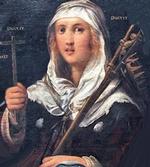Pope reveals he sought counseling, in new book-length interview
September 01, 2017
Pope Francis speaks about his consultation with a psychologist, the influence that women have had in his life, and other personal topics in a new book-length interview to be published next week.
The book, Pope Francis: Politics and Society, is a lengthy interview conducted by French sociologist Dominique Wolton. The book will be published in France on September 6. Excerpts appeared in the French daily Le Figaro on September 1.
In the interview the Pontiff revealed for the first time that he had consulted a psychologist, meeting with her weekly over a period of six months on the 1970s. The sessions “helped me a lot at a moment in my life,” the Pope said, adding that at the time he “needed to clarify things.” He met with the psychologist toward the end of his tenure as Jesuit provincial in Argentina: a tenure that was marked by frequent conflicts.
The Pope also revealed that later, when the psychologist was near death, she contacted him: “Not to receive the sacraments, since she was Jewish, but for a spiritual dialogue.”
Pope Francis referred back to his psychological concerns when he explained that he chose not to live in the papal apartment of the apostolic palace. “It’s for psychiatric reasons,” he said. “I can’t live alone, do you understand?”
In the interview the Pope said that his life had been enriched by the fact that he had “always been in contact with women” and had learned to appreciate the female perspective. He mentioned in particular the influence of Esther Ballestrino de Careaga, an Argentine Communist activist, who “taught me how to think about political reality.”
Speaking at some length about the current situation in Europe, Pope Francis agreed with his predecessors, Popes John Paul II and Benedict XVI, that it was a mistake to omit any reference to Christianity from the founding documents of the European Union. But he argued that Europe’s heritage is not solely based on Christianity:
Yes, it has important Christian roots; that’s true. But that is not enough to define it. There are all of our abilities: the abilities to integrate, to welcome others.
The Pope lamented the fears among Europeans about welcoming refugees today. “Europe, at this moment, is afraid,” he said. He remarked that while a secular life is healthy, in some countries—he specifically mentioned France—the demand for secularization has “carried the legacy of the Enlightenment much too far.”
Elsewhere in the interview the Pope:
- Said that the Church must re-examine just-war theory. He said: “No war is just. The only just thing is peace.”
- Indicated that he remains opposed to legal recognition of same-sex marriage, but favors the acceptance of civil unions.
- Said that he no long feels the anxiety that prompted him to seek psychological counseling, but still is sometimes nervous—particularly when he speaks to journalists during a papal voyage. On those occasions, he said, “I begin with prayer, and then I try to be very precise.”
For all current news, visit our News home page.
All comments are moderated. To lighten our editing burden, only current donors are allowed to Sound Off. If you are a current donor, log in to see the comment form; otherwise please support our work, and Sound Off!
-
Posted by: feedback -
Sep. 02, 2017 8:31 AM ET USA
The leaked parts of the interview are seriously troubling. Also, they would explain some of the "controversial" appointments of new Bishops and Cardinals by Pope Francis. It wouldn't surprise me if the book were withdrawn from publication at the last moment.
-
Posted by: rghatt6599 -
Sep. 01, 2017 3:58 PM ET USA
It is significant when we hear directly from the pope that he favors civil unions for gay couples and he thinks there are no just wars. The evidence was always there that PF was out of step with his predecessors and Catholic Tradition but due to misguided piety many conservative Catholics have been arguing for the past 4 years that the pope is sometimes ambiguous but his orthodoxy on faith and morals should not be challenged. Now that the danger is clear, what do Catholics do now?




